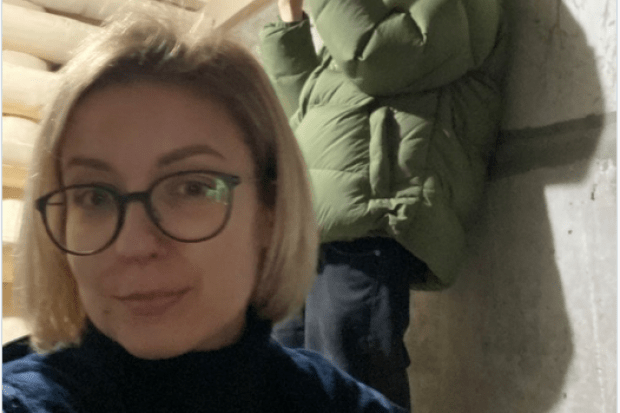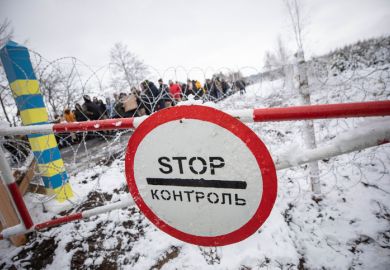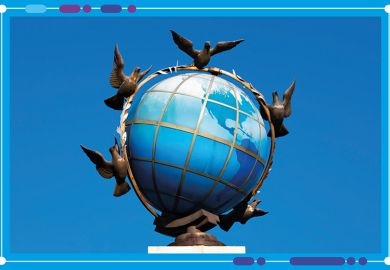“Last night I spoke to my son for the first time in five days – I couldn’t call him earlier because I knew it would break me if he asked when I would see him again,” said Inna Sovsun on missing her nine-year-old boy. “When he did ask me that question, I couldn’t answer.”
A week ago, the 37-year-old Ukrainian MP was preparing to teach a politics module at the Kyiv School of Economics where she has taught since 2010, even after her election to parliament in 2019. “Two days before the war started, I got an email from the university asking me to approve the schedule for the new term,” recalled Professor Sovsun, speaking to Times Higher Education via Zoom.
Since then, her son has left Kyiv with her former husband to stay with his grandparents in western Ukraine while Professor Sovsun has left her apartment to stay at the house of a former student – whose basement currently shelters 12 others at night, giving a degree of protection from the airstrikes raging above.
“Since I am an MP, I cannot leave Kyiv,” explained Professor Sovsun, acknowledging the fact that it has typically been women fleeing Ukraine’s capital with their children to escape the Russian bombardment.
During the day, Professor Sovsun – who was a higher education minister in her twenties under the government formed after the Maidan revolution in 2013, and is now a member of Ukraine’s education select committee – is also in frequent contact with her current and former students, helping to coordinate their various efforts to resist the Russian invasion.
“I’m still very much connected to them – many have joined the civil resistance and are using their different skills,” said Professor Sovsun, who has also taught recently at National University of Kyiv-Mohyla Academy, and was previously a visiting scholar at the University of California, Berkeley.
“Most don’t know how to hold a gun but the computer science graduates are doing what they can to disrupt Russia with cyberattacks and others are just out on patrol, reporting back if they see something suspicious,” she said. “As a lecturer, I have a pretty big network of former students who are texting me, and, as an MP, I can pass these messages on to the right people.
“Today someone managed to get hold of 100 army helmets from Italy and wanted to know where to send them, while we’ve also had messages about food and humanitarian aid.”
Despite the cramped conditions in her current hideaway, she considered herself fortunate, she said. “I’m lucky to have friends to stay with – hundreds of people are staying in the underground, which must be terrible, especially for families with young kids. As a mother, the first thing I did was get my son out of Kyiv – my husband and I have talked about what we’d do if this ever happened.”
A native of Kharkiv, Professor Sovsun said she was appalled to see images of the city’s Karazin National University on fire after it was hit by rockets on 2 March. “They are sending bombs into the middle of a city – this is an old and prestigious university which has produced three Nobel prizewinners and it is burning,” she said.
Professor Sovsun remained hopeful that Ukraine’s military can hold out, even though the fighting might yet intensify as Russia commits more troops and weapons into action. “The first 48 hours were scary but the Russians were pretty much defeated by the Ukrainian army in this period – they barricaded the city, with fighting taking place only 20 minutes from my home,” she said. “I have strong trust in the army because they have a good record in beating those bastards from Russia.”
While her main call to the UK, Europe, US and Nato was for military support, including the creation of a no-fly zone in Ukraine, as well as punitive economic sanctions, academics could also play their part by refusing to work with Russian academics or institutions, she said.
“You need to stop any partnerships with Russia – every single pound that you send to Russia, in gas or oil money or whatever, is being used to kill Ukrainians, including Ukrainian children,” said Professor Sovsun.
“That may sound cruel on Russian academics who do not support the war but, let’s be honest, anyone who is not out protesting on the streets is helping to kill Ukrainians,” she said, urging the West to “speak the truth and do not forget about us”.
Register to continue
Why register?
- Registration is free and only takes a moment
- Once registered, you can read 3 articles a month
- Sign up for our newsletter
Subscribe
Or subscribe for unlimited access to:
- Unlimited access to news, views, insights & reviews
- Digital editions
- Digital access to THE’s university and college rankings analysis
Already registered or a current subscriber? Login








